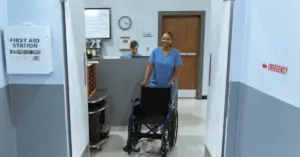One of the top questions travel nurses have when planning a new assignment is “How much will housing cost?” The prices can vary widely based on your destination and preferences.
To get a more accurate idea of what to expect while working as a travel nurse, let’s equip you to decode housing costs, create an accurate budget, and secure the ideal space within your means.
Regional Variances in Rental Rates
Housing costs fluctuate greatly between different parts of the country.
Renting an apartment in San Francisco carries a much higher price tag than leasing a comparably sized place in Omaha.
As you evaluate potential travel nurse assignments, research the typical rental rates in that city or region.
Websites like Zillow, Apartments.com, and RentCafe provide searchable databases to explore average rents for specific locations down to the neighborhood level.
If you have flexibility in selecting assignment regions, comparing housing costs can help guide you toward more affordable destinations.
Furnished vs. Unfurnished Price Difference
Furnished accommodations are a popular choice for travel nurses moving between temporary contracts.
However, furnished units often cost 10-20% more in rent than their unfurnished equivalents. You’re paying a premium for the convenience of move-in-ready amenities.
On the flip side, furnished apartments allow you to avoid large upfront investments in furniture and household items.
Purchasing quality furniture and constantly moving it between assignments can stack up costs quickly. Weigh whether the higher monthly rent for a furnished place balances out the savings on furnishings over a series of contracts.
Hidden Costs to Watch For
The advertised monthly rent rarely tells the whole financial story of leasing a property. As you evaluate housing options, watch out for these key hidden costs:
Utilities – Will you be responsible for paying the electric, gas, water, sewer, and trash bills? This can easily add hundreds more per month depending on local utility rates.
Wi-Fi and Cable – Many short-term and furnished rentals do not include free internet or cable TV access. Budget $50-$100 for adding these services.
Parking – If you have a car, parking costs can sneak up, especially in congested cities. Outdoor lots or garages often charged by the month.
Laundry – Find out if in-unit laundry is available or if you’ll need to use a communal facility in the building or head to a laundromat.
Pet Fees – If you plan to bring pets, you’ll typically pay added pet rent and fees. These can be pricey, so crunch the numbers in advance.
Upfront Expenses Beyond Rent
Aside from regular rental costs, also anticipate initial one-time expenses when starting a lease:
- Security Deposits – Typically equivalent to one month’s rent. This is refundable if you leave the property undamaged.
- Application Fees – Many places charge $30-$50 simply to apply to rent there.
- Cleaning Fees – You may have to pay non-refundable cleaning fees around move-in and move-out.
- Renter’s Insurance – If required, plan for $15-$30 per month for a policy.
Reading the full lease terms ahead of time prevents surprise charges down the road. Come ready to pay these fees upfront.
Shared Housing for Maximum Savings
One strategy to significantly reduce housing costs is choosing shared accommodations with other travel nurses or roommates. You split costs like:
- Rent and utilities
- Wi-Fi and streaming services
- Food and household supplies
- Furniture and amenity purchases
This arrangement dramatically stretches your dollars. However, ensure you find responsible, compatible roommates upfront through roommate finder groups. Clear communication about expectations and responsibilities is essential.
Make the Most of Housing Stipends
If provided a housing stipend through your agency, take time to find the most cost-effective option within your budget range. The stipend amount aims to reflect average regional housing expenses, but you may luck out finding something below that rate.
On the other hand, if none of the lower-priced rentals meet your standards, consider stretching your stipend to a rental you’ll truly enjoy living in. After all, your home environment greatly impacts your overall well-being on assignments.
Temporary Housing for Ultra-Short Contracts
For assignments spanning just a few weeks, temporary corporate housing or even extended-stay hotels may be the most cost-effective move. Compare pricing on platforms like FurnishedFinder, Airbnb, or Vacasa. Many provide amenities like kitchens and laundry so you can avoid eating out constantly.
Hostels and motels are additional budget-friendly solutions for extremely short travel contracts. Just ensure the location and amenities meet your needs.
The Takeaway
With research and planning, you can secure comfortable, affordable housing for every assignment. While costs vary across locations, knowing what to expect and budgeting accordingly means you can focus on the incredible opportunities ahead, not financial stressors.
And remembering that home is wherever your heart feels at ease can help you turn every new dwelling into your own personal sanctuary.






2 comments